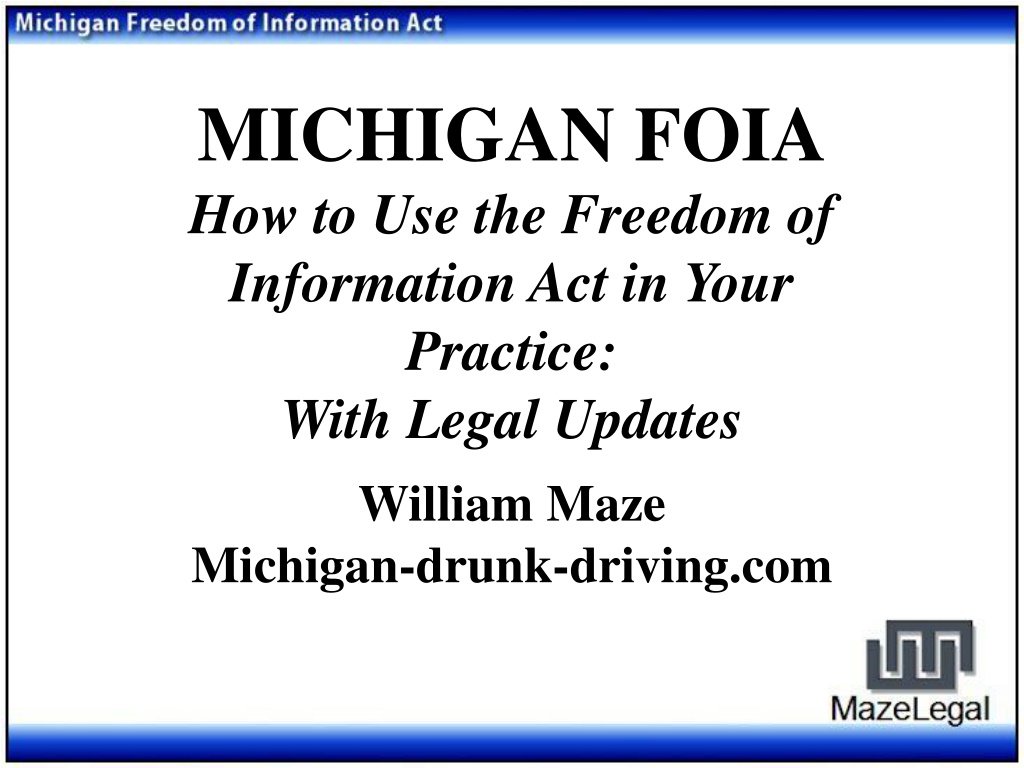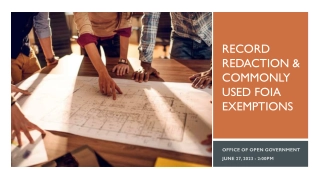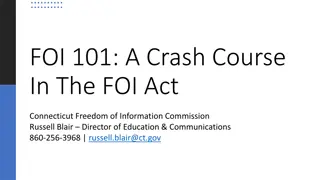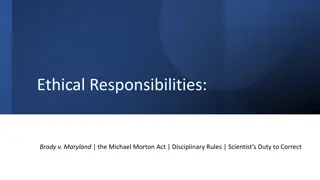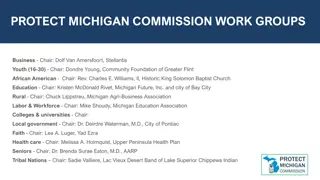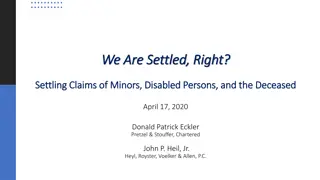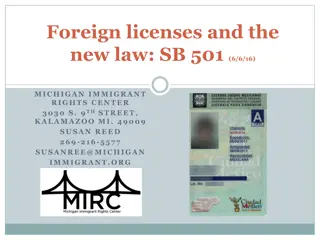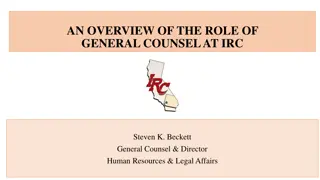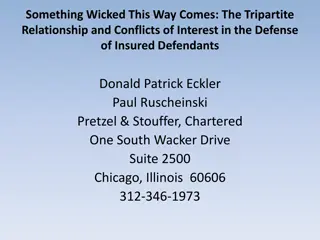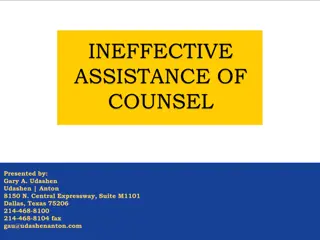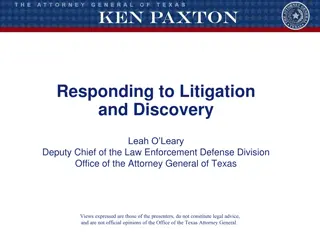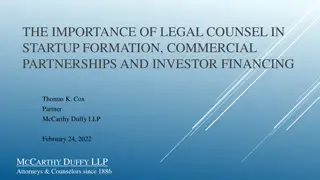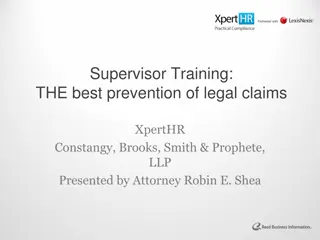Legal Updates on Michigan FOIA, Brady v. Maryland, and Defense Counsel's Role
Explore legal topics such as the Michigan Freedom of Information Act, Brady v. Maryland, and the role of defense counsel in the legal system. Learn about the rights and obligations of prosecutors, defense attorneys, and law enforcement officers in ensuring fair trials and access to evidence.
Download Presentation

Please find below an Image/Link to download the presentation.
The content on the website is provided AS IS for your information and personal use only. It may not be sold, licensed, or shared on other websites without obtaining consent from the author. Download presentation by click this link. If you encounter any issues during the download, it is possible that the publisher has removed the file from their server.
E N D
Presentation Transcript
MICHIGAN FOIA How to Use the Freedom of Information Act in Your Practice: With Legal Updates William Maze Michigan-drunk-driving.com
30 Day Recycle Policy How many of you have heard about this? How often have you been denied access to videos because they were destroyed? Have you ever seen the policy?
Brady v Maryland Due Process Clause of the Fourteenth Amendment to the United States Constitution. Ethical obligations contained in MRPC 3.8 ( make timely disclosure to the defense of all evidence or information known to the prosecutor that tends to negate the guilt of the accused or mitigates the degree of the offense)
Prosecutors Must Play Fair Law enforcement officers have the obligation to convict the guilty and to make sure they do not convict the innocent. They must be dedicated to making the criminal trial a procedure for the ascertainment of the true facts surrounding the commission of the crime. US v Wade (1967) (Justice White)
Defense Counsel's Role: Trickery & Deceit? But defense counsel has no comparable obligation to ascertain or present the truth. Our system assigns him a different mission. We insist that he defend his client whether he is innocent or guilty. If he can confuse a witness, even a truthful one, or make him appear at a disadvantage, unsure or indecisive, that will be his normal course.
Criminal Discovery No discovery in misdemeanor cases. (Administrative Order No. 1999-3) MCR 6.201 sucks anyway. People v Greenfield, 271 Mich App 442 (2006) (Videotapes do not qualify as exculpatory evidence or otherwise require disclosure under rule.) MCR 6.201 burdens the defense!
Let me repeat: MCR 6.201 sucks! He need not furnish any witnesses to the police, or reveal any confidences of his client, or furnish any other information to help the prosecution's case. US v Wade, supra. MCR 6.201: A party upon request must provide all other parties (1) the names and addresses of all lay and expert witnesses whom the party may call at trial . . .
FOIA ADVANTAGES The government has resources and power the individual does not . . . People v Davis, 472 Mich. 156, 188 (2005) Not controlled by judge, prosecutor or police. Not subject to discovery order or rules of discovery.
and MORE! Disincentive for government to deny access to public documents. Burden is on government to justify non-disclosure. You might be able to admit public records at trial.
WHO & WHY? MCL 15.231 et seq. It is the public policy of this state that all persons, except those persons incarcerated in state or local correctional facilities, are entitled to full and complete information regarding the affairs of government and the official acts of those who represent them as public officials and public employees, consistent with this act. The people shall be informed so that they may fully participate in the democratic process. MCL 15.231(2)
FOIA is often explained as a means for citizens to know 'what the Government is up to.' This phrase should not be dismissed as a convenient formalism. It defines a structural necessity in a real democracy. The statement confirms that, as a general rule, when documents are within FOIA's disclosure provisions, citizens should not be required to explain why they seek the information. A person requesting the information needs no preconceived idea of the uses the data might serve. The information belongs to citizens to do with as they choose. National Archives v. Favish, 541 U.S. 157 (2004)
Requestors Identity and Purpose The requestor s identity is not relevant, except as to whether incarcerated or involved in current civil litigation. Public body may not inquire or speculate as to potential purpose or end to which requestor might use public records. Government may NOT claim that releasing certain documents does not further core democratic purpose. They don t get to make that decision on behalf of the people!
WHO IS SUBJECT TO FOIA? MCL 15.232(d) provides a comprehensive list defining the term public body.
DOES NOT INCLUDE: Governor, Lt. Governor, or their direct employees Individual Legislators Courts (and county clerk acting as court clerk) Private companies (except quasi-gov t) Unincorporated association of lake property owners
Examples of who is subject to FOIA: State departments, state agencies, administrative agencies, county and local governments, school boards, police departments, commissions, councils, public colleges and universities. Any program primarily funded by the state or local government is also subject to FOIA. May include PAAM (Prosecuting Attorney Association of Michigan) as well as law firms acting in the capacity of city attorneys.
WHAT IS SUBJECT TO FOIA? Virtually Every Document: handwriting, typewriting, printing, photostating, photographing, photocopying and every other means of recording. It includes letters, words, pictures, sounds or symbols, or combinations thereof, as well as papers, maps, magnetic or punched cards, discs, drums, or other means of recording or retaining meaningful content, but not computer software. BUT CANNOT COMPEL CREATION OF DOCUMENTS
Government Responsibilities Respond with 5 days (10 day extension in now automatic upon public body's unilateral declaration.) MUST separate exempt from nonexempt materials, disclosing ALL nonexempt records. No obligation to redact Redacting is discretionary.
Exemptions: MCL 15.243 (highlights) Unwarranted invasion of individual privacy. Investigating records compiled for law enforcement purposes, but only to the extent that disclosure as a public record would do any of the following: - Interfere with law enforcement proceedings -Deprive a person of a fair trial -Unwarranted invasion of personal privacy Disclose CI Disclose investigative techniques or procedures Endanger life/safety of police
Penal/mental institutions security unless the public interest in disclosure under this act outweighs the public interest in nondisclosure. Trade secrets Attorney-client / physician-patient / religious Frank discussions a/k/a internal discipline investigations Family Educational Rights and Privacy Act
More Police Exemptions Unless the public interest in disclosure outweighs the public interest in nondisclosure enforcement officers or agents. -reveal the contents of staff manuals provided for law enforcement officers or agents. -endanger life or safety of LEOs -disclose personnel records of law enforcement agencies. -identifying an informant or undercover officer -disclose police personal address or telephone -disclose the police relatives -disclose operational instructions for law
Conflict: FOIA vs. Discovery Central Michigan Univ Supervisory- Technical Ass'n, MEA/NEA v Central Michigan Univ Bd of Trustees, 223 Mich App 727 (1997) ( The FOIA is not a statutory rule of practice, but rather a mechanism for the public to gain access to information from public bodies regardless of whether there is a case, controversy, or pending litigation. The fact that discovery is available as a result of pending litigation between the parties does not
Certified Records! MCL 15.233(6): (6) The custodian of a public record shall, upon written request, furnish a requesting person a certified copy of a public record. MRE 803 Hearsay Exceptions; Availability of Declarant Immaterial MRE 902(4) Self- Authentication: (4) Certified copies of public records.
HOW TO SUBMIT A FOIA: KEEP IT SIMPLE!!! Title it FOIA REQUEST To: FOIA Coordinator From: (Requester) Regarding: Describe dates, times, places, and people Ask for exactly what you want.
Clerks are not lawyers Exculpatory evidence will be searched for under the Letter E. If it's not there, they don't know where else to look.
Legal Updates Substantial Changes to FOIA Law in Last Few Years. Recent Case Decisions and Appeals Suggest Only Relief May Be Found in Michigan Supreme Court (Amberg v Dearborn)
Court of Claims Court of Claims (Public Act 164 of 2013) All FOIA disputes must be taken before the Court of Claims Court of Appeals judge, sitting as trial court judge, will decide case. The process is slower. The judge is likely to rule against you.
PA 563 of 2014 Effective July 1, 2015 Public bodies must provide free copies of their procedures, guidelines, and written summary upon request, and are required to include a free copy, or a website link to the policies, in all FOIA responses. Greatly reduced costs and fee disputes.
PA 563 of 2014 No more than 10 cents per normal page, plus labor. Increased punitive damages from $500 to $1,000, and mandates a new $1,000 civil fine which a court must award if it finds the public body has arbitrarily and capriciously violated the act. Additional sanctions of not less than $2,500.00 or more than $7,500.00 when willfully and intentionally violating Act.
Fee Disputes MUST appeal to public body before filing lawsuit. MUST be filed within 45 days. NO ATTORNEY FEES unless you get 50% or more reduction & discretionary fees. $500 punitive damages if arbitrary and capricious
Electronic Records May demand non-paper physical media, by e-mail, or otherwise electronically provided, so long as the public body has the technological capability necessary to provide records on the particular media. BUT... They will refuse it or make it unusable by redacting portions.
But... MCL 15.240(4) VENUE: Venue for an action against a local public body is proper in the circuit court for the county in which the public record or an office of the public body is located has venue over the action.
TRENDS Because of venue provisions (Court of Claim as well as Circuit Court), YOU LOSE. State and Municipal attorneys are using new arguments as well as retreading old ones: Mootness In the particular instance Conflicts with discovery Violates privacy / fair trial
DENIED? Has the government simply ignored the request? Has the government claimed the materials are exempt? Is the information being denied because of who you are? Is the government attempting to charge too much?
I SAVED THE BEST FOR LAST!!!
WHO OWNS PUBLIC RECORDS?
MCL 399.5(2) (2) A record that is required to be kept by a public officer in the discharge of duties imposed by law, that is required to be filed in a public office, or that is a memorial of a transaction of a public officer made in the discharge of a duty is the property of this state and shall not be disposed of, mutilated, or destroyed except as provided by law. . . . The directing authority of each state, county, multicounty, school, or municipal agency,
Cannot destroy records! Michigan law (MCL 399.5 and 750.491) requires that all public records be listed on an approved Retention and Disposal Schedule that identifies the minimum amount of time that records must be kept to satisfy administrative, legal, fiscal and historical needs. Local situations may require retention beyond the periods listed, and nothing prevents a school district from retaining records longer than the specified period of
General Schedule #11 Local Law Enforcement Agencies to constitute an adequate and proper recording of [the government s] activities, and . . . to protect the legal rights . . . of the people. Unless an item appears on the schedule, it cannot be destroyed. It must be sent to Michigan Historical Commission.
Again Who Owns Public Records? MCL 750.491 states: All official books, papers or records created by or received in any office or agency of the state of Michigan or its political subdivisions, are declared to be public property, belonging to the people of the state of Michigan. All books, papers or records shall be disposed of only as provided in section 13c of Act No. 51 of the Public Acts of the First Extra Session of 1948, as added,
MCL 750.491 Any person who shall wilfully carry away, mutilate or destroy any of such books, papers, records or any part of the same, and any person who shall retain and continue to hold the possession of any books, papers or records, or parts thereof, belonging to the aforesaid offices and shall refuse to deliver up such books, papers, records, or parts thereof to the proper officer having charge of the office to which such books, papers, or records
